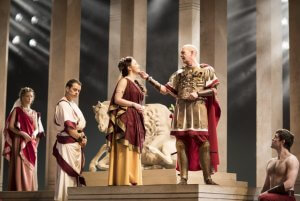
Image Credit: Helen Maybanks (RSC)
The demise of Julius Caesar is known throughout the realms of literature, history, theatre, politics and mythology. The tragedy has been passed down from ancient toga wearing historians all the way to the modern, jean-wearing, era. His is the story of Rome’s prodigal son, who went to war with his elders; and won. Rather than be content with his good fortune, Caesar demanded the spoils to match his victory. He wanted control of Rome all to himself. Why not? His divine protection, supposedly from the goddess Venus, had helped him get this far. Why would she abandon him when unrivalled power was within reach? Well, according the historian Plutarch; Caesar flew too close to the sun, and burnt his lucky wings off.
The irony is, that in death, Caesar finally became revered in the royal fashion he so badly craved in life. His name gave birth to the title of Caesar, also known as Kaiser or Tzar. It is a type of king who says he’s not a king, but still wears the crown.
In the 1600s WIlliam Shakespeare adapted Plutarch’s account to his own play. Although it was very likely the death of Caesar had been reducing theatre audience members to tears for centuries, Shakespeare’s adaptation remains the most famous (yes, I have heard the internet theories that he didn’t write any of his shit). This is because Shakespeare writing about the Roman Senators is like the 1600s equivalent of Martin Scorsese telling us the story of an American gangster today. No one else could have done it so well.
In early 2017 I had been reading a book on Republican Rome (Rubicon by Tom Holland) and wanted to see Rome come alive on stage. I waited almost a year for the O.G Royal Shakespeare play to come to London. Whilst there are many other film and stage adaptations of Julius Caesar, the Royal Shakespeare Company carry the reputation remaining faithful to their namesake; no reboots. So I waited.
Eventually Rome had come to London. I attended an evening show on a cold December night at a packed Barbican Theatre. The crowd was mostly older, as to be expected. Caesar is not as popular as Darth Vader these days, but their resumes are comparable.
Andrew Woodall was formidable in his lead role as Caesar. He channelled a charisma synonymous with the Roman Senator, that kept all eyes on him whilst on stage. The supporting lead roles of Brutus and Cassius had a charged stage chemistry. You could believe the actors bold declarations of affection for one another that drove the plot. Alex Waldmann (Brutus) was also subtly cold towards his wife in comparison, a nuance that shows the actors understanding of the character.
The set was relatively minimal but well used. The play put the characters in humble settings, such as a camp tents. However, I do wish they had done more to distinguish scenes in the Senate. The Senate House was like House a of Lords, where upper-class old men ran an empire spanning France to Egypt from. It was surrounded by statues and grand temples; which they could have incorporated on the set to give a sense of Roman grandiose.
I highly recommend the play to people of all backgrounds and interests. The tragedy of Julius Caesar has universal themes which are timeless. This adaptation is beautifully told and wonderfully acted. You will leave having the prestige of the Roman empire rubbed off on you, and that is a credit to director Angus Jackson and the RSC team.
Julius Caesar is showing at the Barbican until January 20th 2018. For tickets click here.
